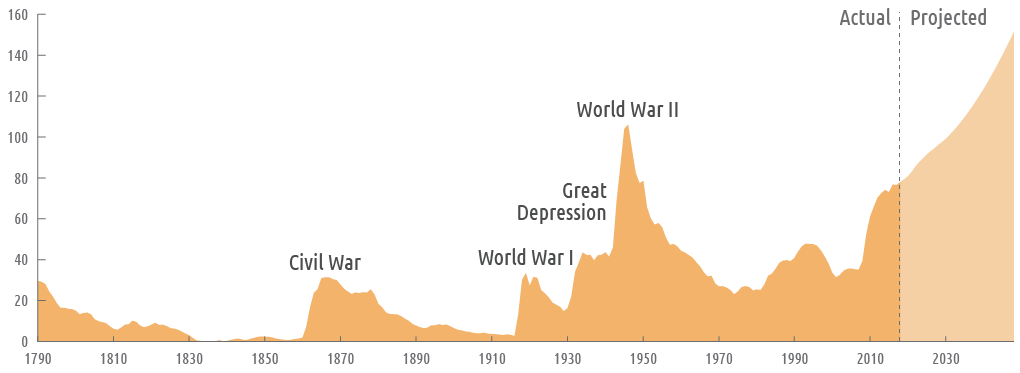Neither Party Cares About The Debt
Admittedly liberal news site MotherJones tweeted several times recently:
1. The GOP doesn’t care about the debt
2. The GOP doesn’t care about the debt
3. The GOP doesn’t care about the debt
And linked to their article about the Iraq War, which really just quotes someone else’s article that says the current campaign against ISIS will cost about $15 billion a year, on top of the $1.5 trillion already spent in the past 11 years of fighting in Iraq.
Oddly, more respectable sources have already said that the Iraq war is closing in on $2 trillion, with a grand total of $6 trillion possible before it’s all said and done.
My response was simply:
“Neither major party cares about the debt, clearly. They just have different reasons to run it up.”
The U.S.’s current national debt is something like $17.7 trillion and counting, though about $5 trillion of that is owed to other parts of the U.S. government, which most people wouldn’t count, leaving about $12.7 trillion. Almost half of that is owed to foreign investors, the two largest of which are China ($1.26 trillion) and Japan ($1.21 trillion).

U.S. debt as a percentage of GDP, projected to 2038. (Source, .pdf file, Congressional Budget Office, public domain)
Except for a brief period during Andrew Jackson’s presidency, the U.S. has always carried debt. It’s often expressed as “a percentage of GDP” (see chart above), since this is an accounting trick to make it look like our debt isn’t that bad. In dollars, it’s currently higher than it’s ever been, and is projected to keep rising.
For the mathematically challenged, $12.7 trillion is just over $40,000 for every human being in our country. That’s $160,000 for my household, for example.
Many financial experts insist that debt is necessary to run the country, much like personal debt is necessary for many households — mortgage, car loans, student loans, etc. However, I’ve known quite a few people in my lifetime who live happily without any debt at all. They may not all drive brand new vehicles, live in McMansions, or have college educations, but they’re not starving or living under bridges either.
President Barack Obama is often blamed for the current all-time high national debt, though his presidency has only added icing on top of a long-baked cake, according to most accounting I’ve seen. The recession that began in the previous presidency meant lowered earnings and spending for many Americans, and therefore less tax intake to the federal government. This opened up a hole. And of course, the aforementioned wars, voted on by both Republicans and Democrats.
The Democratic Party is often painted as the party of debt, and it’s easy to believe. Year after year, it seems democratic candidates or officials propose or institute programs that the nation simply can’t afford. On the other hand, Republicans can be quite handy at spending money as well. There are only a few ways to pay for such things: raise taxes, borrow money, or cut somewhere else.
Neither party wants to be seen as the one that raised taxes (though both of them do, occasionally), and neither party usually has the stomach or ability to cut other programs.
It means both are responsible for the debt.